Transgender and proud in Lebanon
Beirut, February 4, 2016 -- I never realized we had transsexuals in Lebanon. Or rather, every country has its trasnssexuals and transgenders, but I didn’t realize they would go public here. When I did, it was a bit of a shock. We are still in the Middle East after all.
Beirut might be a very open city, it’s often called the gay capital of the Middle East, but still, we’re in a very conservative and religious environment, on all sides.
I became aware of the issue when I heard about the court case. In January, an appeals court allowed a transgender man to officially change his sex in the national registry. When I heard that the case was before the court, it was an eye-opener -- transsexuals were going public in Lebanon. So I asked my gay friends to hook me up with some.
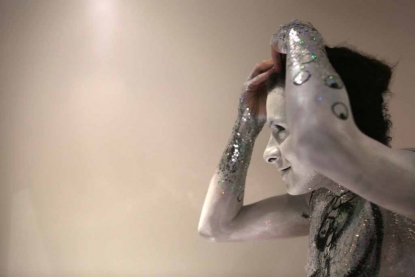 Hans, a 22-year-old Lebanese drag queen, prepares himself for a show. January 15, 2016. (AFP / Patrick Baz)
Hans, a 22-year-old Lebanese drag queen, prepares himself for a show. January 15, 2016. (AFP / Patrick Baz)I first met Hans Harling, a drag queen who is a kind of a local star in Beirut's gay-friendly night clubs, where he often performs. He in turn introduced me to Sasha and Toy, two of his transsexual friends.
 Hans (back) smokes in an underground parking lot with Toy (right) and Sasha before performing in a show north of Beirut. January, 2016. (AFP / Patrick Baz)
Hans (back) smokes in an underground parking lot with Toy (right) and Sasha before performing in a show north of Beirut. January, 2016. (AFP / Patrick Baz)Then came another surprise. I thought it was going to be difficult, that they wouldn’t want to be photographed, that I would have to convince them. I brought my wife along, to make them feel at ease.
In the end, I was the one who ended up being the apprehensive and tense one. They were completely at ease about everything.
I suppose part of it was because they are so young -- they are all in their 20s. But the three that I ended up photographing all said “go ahead, photograph away.” They wanted to show that this is who they are and they have no issue with it.
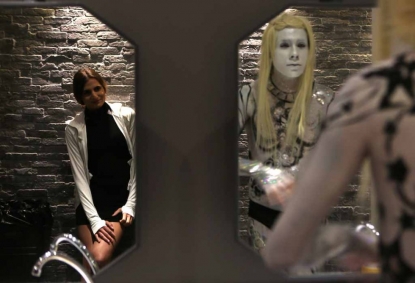 Hans readies to perform as Sasha looks on. January, 2016. (AFP / Patrick Baz)
Hans readies to perform as Sasha looks on. January, 2016. (AFP / Patrick Baz)During the shoots, they were more comfortable than I was. That was actually the fun part. I would ask them where they wanted to be photographed in public. “You pick the place where you want to do the shooting,” I would say. And when they did, I was like “are you sure?”
'What's wrong?'
Don’t get me wrong, we were in a cool neighborhood. Downtown Beirut, upper class. I wouldn’t shoot them in a Hezbollah neighborhood or a conservative Sunni or Christian one.
But still.
During the shoots, I was worried. I kept looking around, waiting for someone to show up and start causing trouble. But they were not. At all. They kept laughing at me, saying “what’s wrong?”
In the end, noone was aggressive toward them. We were in an upper end neighborhood but still. It was a great experience and I ended up being really happy for them. I was happy that one was addressed as “she” by the waiter, that they succeeded in appearing as she and that noone caused trouble.
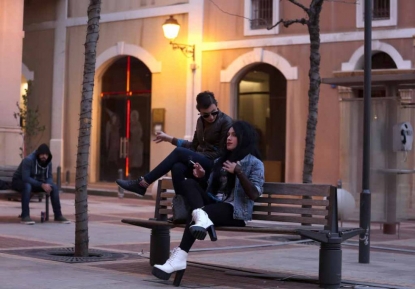 Hans and Toy on a bench in downtown Beirut. January, 2016. (AFP / Patrick Baz)
Hans and Toy on a bench in downtown Beirut. January, 2016. (AFP / Patrick Baz)Troubles at home
I’m not trying to paint too rosy of a picture of their lives. All of them have problems with their families.
Sasha’s brother used to beat her up every day because of her feminine attitude and one beating landed Sasha at the hospital at the age of 16. So she took up martial arts to defend herself and a year later beat up her brother. He hasn’t touched her since. Her mother and sisters accept her. But her father and brother don’t. She’s still scared when she goes home every day, she locks herself in her bedroom at night. One of the transsexuals that I talked to is applying for asylum in the UK. So their lives aren’t exactly easy.
Another problem that they face is the cost. They are all young, so they don’t have a lot of money and hormone pills are expensive, doctors are expensive. Hormone medicine costs 200-300 dollars per month; a sex-change operation costs 15,000-30,000 US dollars. They don’t have this type of money.
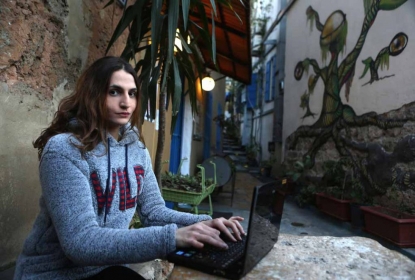 Sasha at a Beirut cafe. January, 2016. (AFP / Patrick Baz)
Sasha at a Beirut cafe. January, 2016. (AFP / Patrick Baz)After we finished the shoots, I was apprehensive about actually publishing the story. I was concerned -- am I doing the right thing? Am I going to jeopardize them by publishing their photos? They said go ahead, but they’re young.
And then Sasha called me and said she was going to appear on a conservative Christian television show. I said, “be extremely careful, they will lynch you.” And she said, “no, no, don’t worry, I talked to the anchor, everything is going to be fine.”
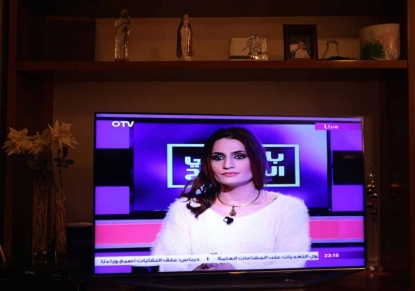 Sasha appears on a talk show on OTV, a Lebanese Christian channel. January, 2016. (AFP / Patrick Baz)
Sasha appears on a talk show on OTV, a Lebanese Christian channel. January, 2016. (AFP / Patrick Baz)Step forward
And in the end, it was. She appeared on the show with a few others, including one who went incognito. But the show gave them the time to explain their way of life and I found it absolutely amazing. That this conservative television station was giving them a voice.
That, coupled with the judge’s decision, put me at ease.
After my pictures came out, a newspaper here, L’Orient Le Jour, published them. Sasha sent me a message “great, cool, wow.” Another sent me a smiley. They’re happy with it. It’s a step forward.
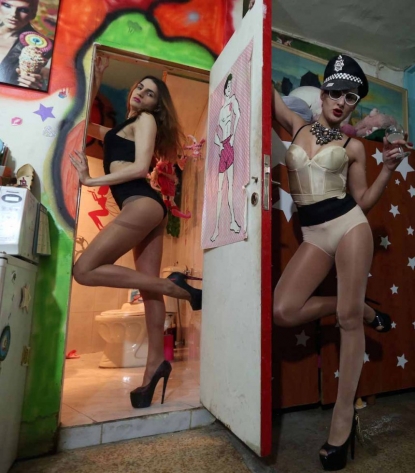 Sasha (left) and Toy (right) pose for a photo at a Beirut art studio. January, 2016. (AFP / Patrick Baz)
Sasha (left) and Toy (right) pose for a photo at a Beirut art studio. January, 2016. (AFP / Patrick Baz)And frankly, I’m very happy with the story. It shows another side of Beirut, which is this schizophrenic city that has everything. It’s better to cover people trying to change their sex than people trying to kill each other. It’s a positive story coming out of the Middle East.
And I also hope that my story helps them make some noise, to get some more acceptance. Because they’re not harming anyone. So give them a break.
Patrick Baz in an AFP photographer based in Beirut. Follow him on Twitter and Instagram.
This blog was written with Yana Dlugy in Paris.
 21-year-old transsexual Toy poses for a photo at an art studio in Beirut. January, 2016. (AFP / Patrick Baz)
21-year-old transsexual Toy poses for a photo at an art studio in Beirut. January, 2016. (AFP / Patrick Baz)
